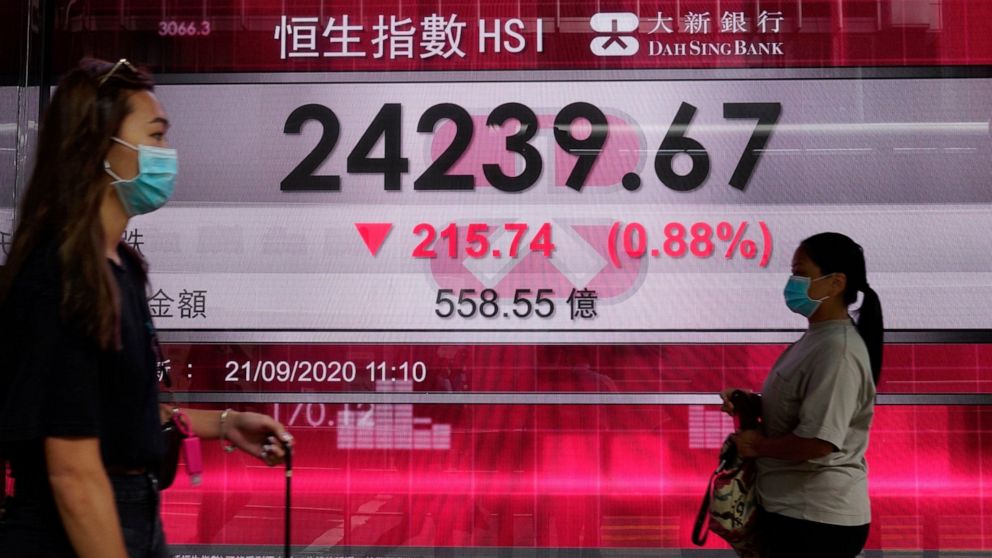Stocks drop heavily on US-China spat, fear of more lockdowns
Global stock markets and U.S. futures are down sharply due to U.S.-Chinese tension over technology and security
BEIJING — Global stock markets and U.S. futures tumbled Monday due to U.S.-Chinese tension over technology and security and the prospect of tougher restrictions on public life in Europe to limit coronavirus cases.
The sell-off gathered pace in European trading hours, with shares in many travel-related companies falling upward of 10%. Futures are pointing to a drop on Wall Street when it opens.
On Friday, the White House added to tension with the Chinese government by announcing downloads of the popular Chinese-owned messaging app WeChat would be banned as a security risk.
A federal judge agreed Saturday to postpone the WeChat restrictions on the grounds they might interfere with free speech. The same day, President Donald Trump endorsed an agreement for TikTok, a unit of China’s ByteDance Ltd., to form a U.S. company with Oracle Corp. and Walmart Inc.
China responded over the weekend with a statement saying it may take “necessary measures” to protect Chinese companies.
Futures for the S&P 500 index and the Dow Jones Industrial Average were off 1.7% and 2%, respectively. In Europe, the FTSE 100 in London tumbled 3.3% to 5,808. Frankfurt’s DAX sank 3.2% to 12,695 and the CAC 40 in Paris lost 3.2% to 4,821.
Shares in travel stocks were hit particularly hard after British authorities warned about an exponential growth in the number of new coronavirus cases. Prime Minister Boris Johnson later this week is expected to announce a slate of short-term restrictions that will act as a “circuit breaker” to slow the spread of the disease.
The number of cases has been rising quickly in many European countries and while authorities don’t seem ready to return to the tough restrictions on public life that they imposed in the spring, the new wave of the pandemic threatens the economic outlook.
In Asia, the Shanghai Composite Index lost 0.6% to 3,316.94 and the Hang Seng in Hong Kong shed 2.1% to 23,950.69. The Kospi in Seoul was 1% lower at 2,389.39 while Sydney’s S&P-ASX 200 declined 0.7% to 5,822.60.
India’s Sensex fell 2% to 38,065.67. New Zealand and Southeast Asian markets declined.
Global markets have recovered most of this year’s losses, though the bulk of gains went to big tech and some other stocks, while most issues still are down.
Investors have been encouraged by central bank infusions of credit into struggling economies and hopes for a vaccine to end the coronavirus pandemic that plunged the global economy into its deepest downturn since the 1930s.
But market momentum has faded with a rise in virus cases and after the Federal Reserve said last week that the U.S. economic outlook is uncertain. U.S. lawmakers also have yet to agree on a new support package ahead of elections for president, Congress and some Senate seats.
“With 43 days to the U.S. election, fingers crossed may be what little one can do when it comes to the fiscal stimulus hopes,” said Jingyi Pan of IG in a report.
In energy markets, benchmark U.S. crude lost 88 cents to $40.23 per barrel in electronic trading on the New York Mercantile Exchange. Brent crude, the price standard for international oils, declined 90 cents to $42.25 per barrel in London.
The dollar declined to 104.11 yen from Friday’s 104.18 yen. The euro retreated to $1.1773 from $1.1843.
![]()


